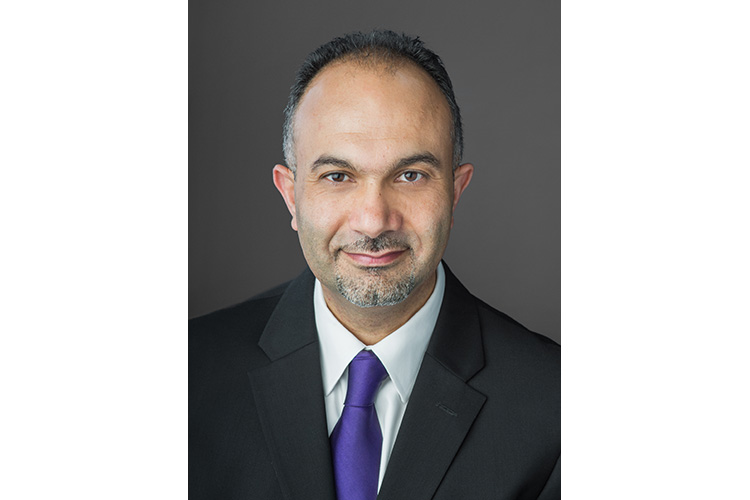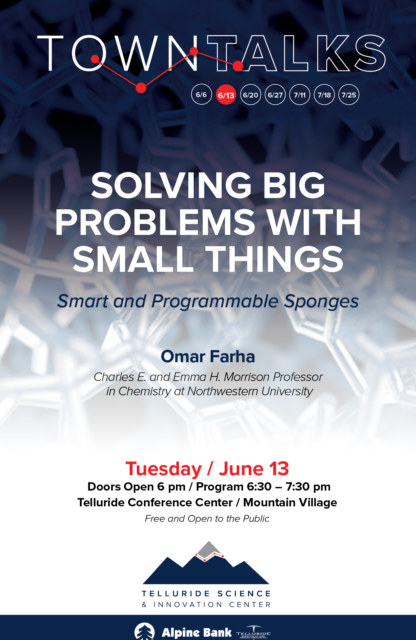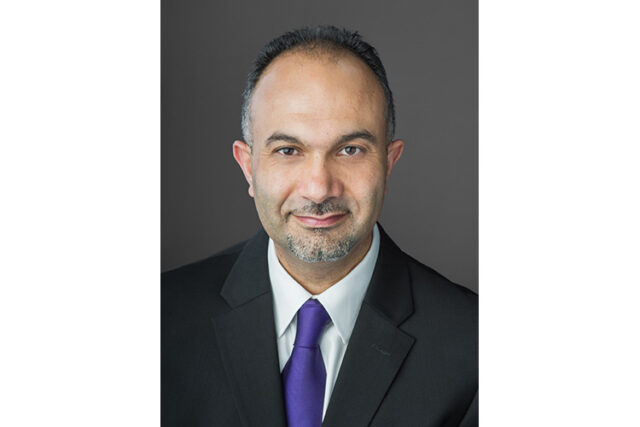
08 Jun Telluride Science Town Talk: “Solving Big Problems with Small Things,” 6/13!
Dr. Omar Farha continues the 2023 Telluride Science Town Talks series with his presentation titled “Solving Big Problems with Small Things.” The event takes place June 13th, 6:30 pm, at the Telluride Conference Center in Mountain Village. Town Talks are FREE and open to the public.
Visit telluridescience.org to learn more about Telluride Science and the capital campaign to transform the historic Telluride Depot into the Telluride Science & Innovation Center. The venue will be permanent home for Telluride Science and a global hub of inspired knowledge exchange and development where great minds get to solve great challenges.
The 2023 Telluride Science Town Talks series is being presented by Alpine Bank with additional support from the Telluride Mountain Village Owner’s Association.
Go here for more on Telluride Science.
Go here for more on Town Talks.

According to online sources, less than 1% of the world’s freshwater is available for consumption. However pollutants in drinking water are only one of a number of dangerous environmental threats impacting our planet today.
Droughts are also a serious hazard. Stats published by the World Health Organization state that 40% of the world’s population is impacted by water scarcity.
Another of the biggest and most destructive carbon footprints derives from unrecyclable plastics on land and at sea.
Clearly, our planet needs a major spring cleaning.
The good news? There are exciting new materials on the horizon that do just that – and lots more.
One of those solutions is the subject of the upcoming Telluride Science Town Talk titled “Solving Big Problems with Small Things.” The speaker is Dr. Omar Farha, professor of chemistry at Northwestern University and founder of the startup NuMat Technologies. He is part of a team focused on solving global challenges through technology.
Enter Metal-Organic Frameworks or MOFs.
To the scientific community, MOFs are crystalline porous compounds made of organic and inorganic materials.
For the rest of us, MOFs can be thought of as sponges, albeit a highly advanced species. To the naked eye, they typically appear as multi-colored sand. Each “grain of sand” as it were contains thousands of spaces to capture offending material.
In the words of Farha:
“MOFs are ordered, crystalline sponges. Every hole in each of them is the same and we can program these cavities to be sticky for certain molecules and not sticky for others.”
Just like sponges soak up liquids, MOFs soak up nanoscale materials like gases and vapors. However, while sponges absorb liquids and everything in them, MOFs are very specific about what they take up:
“We have the ability to make them selective for different pollutants,” continued Farha.
This property is what makes MOFs what Farha described as a platform technology:
“Eighty years ago, few people in the world had heard of polymers. But in the late 1930s, one polymer—nylon—became a household word in just a few months. While nylon took the stockings market by storm, the progression toward polymers becoming ubiquitous in clothing and beyond—in kitchenware, electronics, building materials, medicine, and more—took decades. We now know that polymers were one of the materials that characterized the 20th century.
“Looking ahead, Metal–Organic Frameworks (MOFs), or smart and programmable sponges, are poised to be a defining material of the 21st century. Though this class of multidimensional crystalline materials is still in its early stages, 50 years from now, they will be an ever-present part of human life just as polymers are today.
“Think of MOFs as nano-sized Tinker Toy assemblies which repeat in periodic arrays. Researchers around the world have explored the relevance of MOFs for applications including, but not limited to, drug delivery, water harvesting, gas storage, separations, and more.
“Importantly, start-up companies have recently undertaken MOF commercialization within industrial sectors. This Town Talk will focus on Metal–Organic Frameworks as the enabling materials for protection from Basic Science to Implementation and Commercialization.
For example, right now in his lab, Farha is conducting research on several of those applications, including personalized water filtration. By programming MOFs to select for certain pollutants in a water source, each region can have its own “smart” filtration. That innovation has the potential to take average water filtration to a new level of efficiency.
Farha and his team also work closely with the United States Department of Defense to develop MOF technology which can degrade nerve agents.
MOF research shows great promise around degrading harmful plastics and extracting water from the air for human consumption.
“If we use our imagination as to what we do with MOFs, the possibilities are endless,” exclaims Farha.
Dr. Omar Farha, more:

Omar Farha grew up in the West Bank of Palestine with his parents and nine siblings.
He was educated in his homeland through high school, after which time he moved to the United States to attend college.
Farha began his work in chemistry at UCLA where he received his undergraduate and graduate degrees. He then went on to do a postdoc in porous materials where today he conducts his ground-breaking research: Northwestern University with his team at his tech company, NuMat Technologies. The mission: “Deliver atomically precise solutions to the problems that matter.”


Sorry, the comment form is closed at this time.